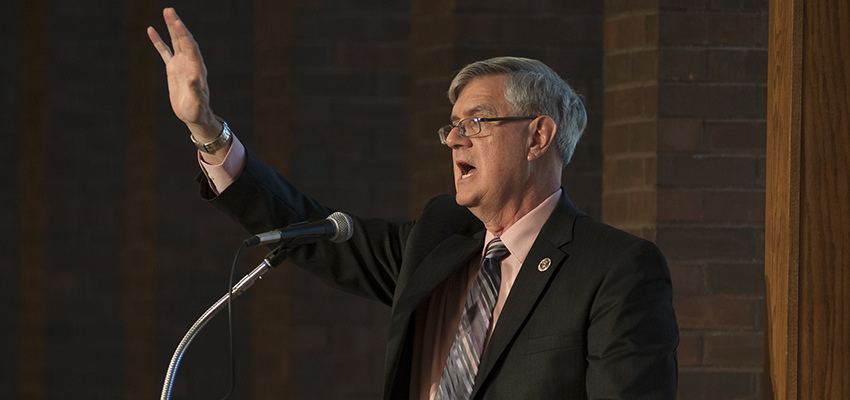An Illinois State alumnus turned judge told students Wednesday that federal sentencing laws were forcing “excessive and unwarranted” prison terms and not having the intended impact on the war on drugs.
U.S. District Judge Michael P. McCuskey ’70, who is also Illinois State’s Board of Trustees chairman, was the featured speaker at the American Democracy Project’s celebration of Constitution Day.
In front of a packed Prairie Room crowd at Bone Student Center, McCuskey said that “mandatory minimum” sentencing laws passed by Congress had taken away judicial discretion, and given too much control to prosecutors. McCuskey shared some startling sentencing stories from his own courtroom over the years, including one about a Chicago bus driver whose third nonviolent offense—a minor drug transaction—and lack of cooperation with prosecutors forced McCuskey into issuing a life sentence.
“There’s a lot of nights I can see his face, where he said, ‘Judge, I’m gonna get you reversed,’ and I meaningfully said, ‘I hope so,’” said McCuskey, calling the offender a “regular pen pal.”
McCuskey, who presides in the Central District of Illinois and is based in Urbana, said he’s no “liberal” when it comes to sentences. But he observed a significant decline in how much sentencing discretion he had when he moved from state to federal court, where federal mandatory minimum laws apply. McCuskey says those laws sometimes prevent him from issuing sentences in criminal cases that are “appropriate and reasonable, not greater than necessary,” as required in the U.S. criminal code.
“And almost for the first 195 years of our country, that was true,” McCuskey said.
Prosecutors win 98.5 percent of all jury trials in federal court, he said, and in the Seventh Circuit (which includes Illinois) that figure is 100 percent the past three years. Those odds, combined with prosecutor discretion to offer sentencing deals to cooperating witnesses, means that the “federal government holds all the cards” in the sentencing phase, according to McCuskey.
“We have street crimes all the time that can be charged (in state court) but aren’t. Why are they brought to federal court? For a higher sentence,” he said.
The effect of this lopsided system, he said, is that the U.S. has 5 percent of the world’s population but 25 percent of its prisoners, and seven times as many prisoners as were behind bars in the 1970s. The cost of that over-incarceration, he said, will be paid by today’s college students in taxes the rest of their lives.
McCuskey said he hoped some of the students listening to his speech would help fix the problem later in life. He also touted a legislative push by congressional odd couple Sens. Patrick Leahy, a Democrat from Vermont, and Rand Paul, a Republican from Kentucky, to reform mandatory minimum sentencing.
“Give me a break. It doesn’t make sense,” McCuskey said.
Constitution Day festivities are sponsored by the American Democracy Project, a cooperative effort by students, faculty, and staff at Illinois State to promote civic engagement. The event honors the core principles of the Constitution—chiefly federalism and the separation of powers, said Thomas McClure ’76, M.S. ’01, assistant professor and director of legal studies in the Department of Politics and Government.
McCuskey was chosen to speak on Constitution Day in part because he embodies those principles, as someone who served both on the state and federal bench and was appointed to the latter by a Democratic president (Bill Clinton) and confirmed by a GOP-controlled Senate, said McClure, who has argued cases in front of McCuskey.
“Here’s someone who understands what it means to be an effective Illinois State University citizen,” he said.
Ryan Denham can be reached at rmdenha@IllinoisState.edu.



